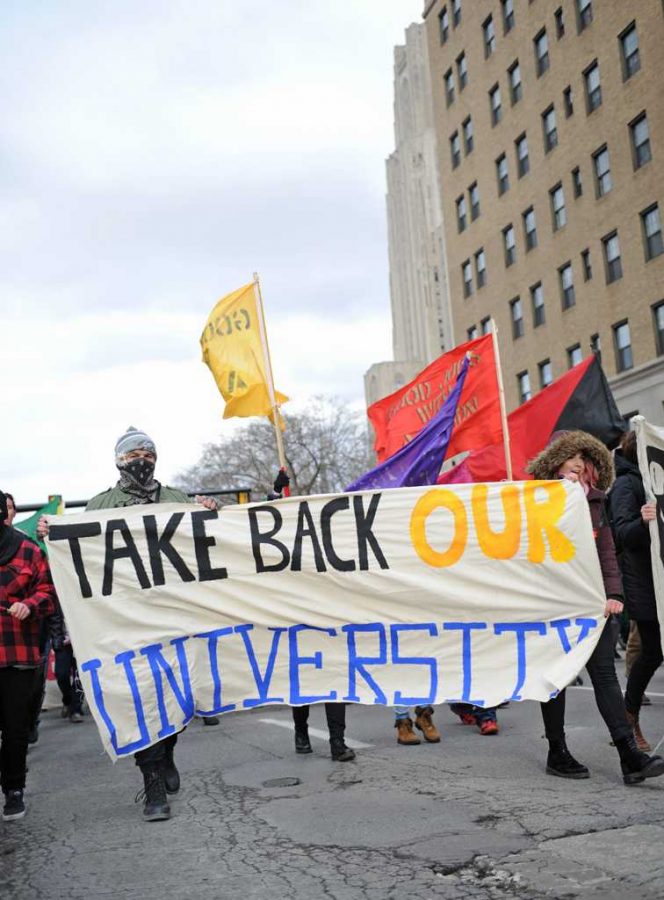Pitt students and community members marched through campus to protest minimum wage and student debt Friday.
United Students Against Sweatshops, a nationwide student-led labor activism group with a chapter at Pitt, hosted the “March to Take Back Our University” on Friday, Feb. 26, to advocate increasing the minimum wage to $15 for all campus and student workers and to protest rising student debt. USAS has organized similar protests on other campuses, such as Rutgers University, Ohio State University and Cornell University.
About 250 people, including USAS members, Pitt students and other members of the community circled Forbes Avenue, starting and ending at the Cathedral of Learning, chanting, “Show me what democracy looks like!” and “What do we want? 15! When do we want it? Now! If we don’t get it? Shut it down!”
They carried signs that read “RECLAIM PITT,” “Power To The Grads,” “Student Workers Need 15,” and “Too Poor 4 Food? Eat UR Boss,” along with many other slogans.
Pitt students joined the march out of concern over their own career prospects and for those currently in the workforce. Chelcie Alcorn, a junior majoring in biology and psychology, said she wants to see Pitt and UPMC pay all their workers $15 an hour.
“Welfare programs end up subsidizing the employees of companies that pay minimum wage,” Alcorn said. “If you want to end welfare, you should raise the minimum wage.”
Currently, 42 percent of U.S. workers make less than $15 per hour, according to the National Employment Law Project, and the average first-year student at Pitt takes out $9,392 of loans in their first year, according to College Factual.
Pitt spokesperson Ken Service said it was important for students to get involved in the political process, but they should focus their efforts on protesting the state government. According to Service, Pitt is currently dipping into its reserves after the political gridlock between Gov. Tom Wolf and the legislature has locked up $147 million in educational funds.
“Pitt tries to pay a fair wage for the work that’s done,” Service said. “Outside of hourly wage, you have to look at total compensation. Pitt has some of the best benefits in the region.”
According to the 2015-2016 summary guide to benefits, Pitt offers eligible faculty and staff medical plans, vision plans, dental plans and life insurance.
Mike Zielinski, member of United Steel Workers Local 36-57, said he came to the protest to support a “living wage” for people struggling to make ends meet.
“I hope [this protest] will be a wake-up call to the University and all these employers undervaluing people,” Zielinski said. “[Employers] need to do the right thing, raise wages and respect the rights of their employees to form unions.”
In a short speech before the march began, Pitt USAS member and student Kai Pang compared the deficit between wages and expenses for students, and Americans, to the 2008 economic recession. Both crises, he said, were a result of the shortsighted greed of employer’s motivation to profit off their ventures, regardless of consequences.
“The University is being made more prestigious off student debt,” Pang said. “And it is disgusting.”



